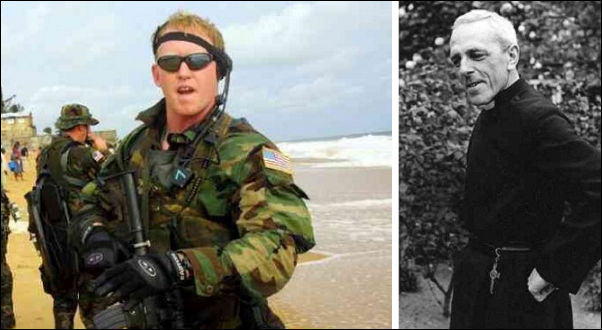[ by Charles Cameron — in the wake of the recent “kill and tell” revelations ]
.
**
The Ethos of the Navy SEALs, as laid out by Force Master Chief Michael L. Magaraci and Rear Adm. Brian L. Losey, commander of Naval Special Warfare Command, in a letter that can be found at SOFREP:
At Naval Special Warfare’s core is the SEAL ethos. A critical tenant [sic] of our Ethos is “I do not advertise the nature of my work, nor seek recognition for my actions”. Our Ethos is a life-long commitment and obligation, both in and out of the Service. Violators of our Ethos are neither Teammates in good standing, nor Teammates who represent Naval Special Warfare. We do not abide willful or selfish disregard for our core values in return for public notoriety and financial gain, which only diminishes otherwise honorable service, courage and sacrifice. Our credibility as a premier fighting force is forged in this sacrifice and has been accomplished with honor, as well as humility.
**
I read this particular paragraph with the eye of a student of religions, and that last word in particular tells me I’m on the right track when I compare it with passages from the Rule of St Benedict, — the “Ethos” if you will of western monasticism:
Let us act in conformity with that saying of the Prophet: “I said I will guard my ways lest I sin with my tongue; I have put a bridle on my mouth; I was dumb and was humbled and kept silence from good things.” Here the prophet shows that if we ought at times for the sake of silence to refrain even from good words, much more ought we to abstain from evil words on account of the punishment due to sin. Therefore, on account of the importance of silence, let permission to speak be rarely given even to the perfect disciples, even though their words be good and holy and conducive to edification, because it is written: “In the multitude of words there shall not want sin.”
and:
THE Sacred Scripture cries out to us, brethren, saying, “Everyone who exalts himself shall be humbled and he who humbles himself shall be exalted.” In saying this it teaches us that all exaltation is of the nature of pride, which vice the Prophet shows that he took care to avoid, saying: “Lord, my heart is not proud, nor are my eyes haughty, nor have I walked in great matters, nor in wonderful things above me.” And why? “For if I were not humbly minded, but had exalted my soul, as a child that is weaned from its mother, so would my soul likewise be rewarded.”
**
I am undoubtedly biased in these matters, and with good reason — but it is my contention that the monastic orders are the premier examples of authentically elite groups in western civilization — the Qur’an even honors them, saying in Sura 5. 82:
nearest among them in love to the believers wilt thou find those who say, “We are Christians”: because amongst these are men devoted to learning and men who have renounced the world, and they are not arrogant.
And the source of monastic integrity? Humility, that key concept in both the SEAL and Benedictine quotes above, and renunciation — the monastic’s acquired taste for simplicity rather than riches, and for the discipline of silence rather than boastfulness..
**
An unsightly brag:
**
My own proposed motto for the SEALs, in light of all this, comes not from Benedict’s Rule but from Ludwig Wittgenstein‘s Tractatus Logico-Philosophicus, proposition 7:
Whereof one cannot speak, thereof one must be silent.




